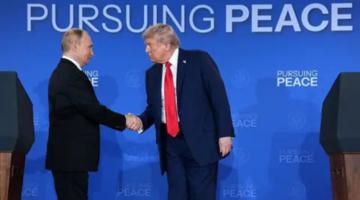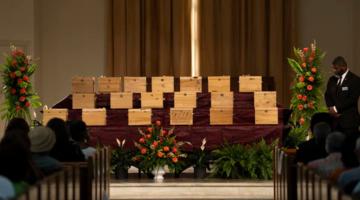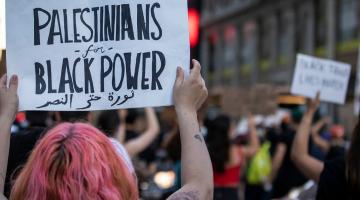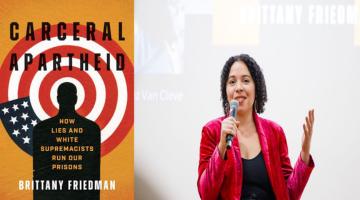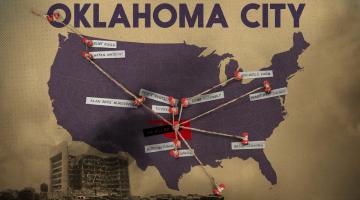Not just in the White Settler States, but throughout the Black world the very possibility of Black citizenship has been gutted.
The initial impulse behind the organization of a forum on Black citizenship for The Black Agenda Review was to forward an argument asserting that, wherever one goes in the world, Black people have very little access to full citizenship. In thinking through that argument, and in reading the responses by our contributors, we quickly came to the conclusion that that the initial impulse was slightly misguided. It is not that Black people have limited access to full citizenship. It is that Black people actually have no access to full citizenship.
But what is citizenship? In the most basic terms, citizenship has been defined through the conferral, usually by the authority of a nation-state, of civil, social, and political rights, privileges, and protections to the members of a given community. It is assumed that citizenship affords the right to full participation in society, and access to all the benefits of community. Of course, it is not a stretch to say that this is an ideal, and perhaps even a fantasy. Historically, such text-book definitions of citizenship have only been granted to a subset of white people.
Black people–descendants of the formerly enslaved and children of the once-colonized–not only entered the arena of citizenship at a political and economic disadvantage, but our very access to citizenship has been delimited, circumscribed, curtailed, and revoked. In the majority-white settler-colonial countries such as Canada and the United States, as well as in the decaying old world polities of Europe, Black people are not considered members of the white nation and are treated in law and practice as what Malcolm X described as “second-class citizens.” In the putatively-independent Black majority states of the Caribbean and Africa, the shift from colonial “subject” to national “citizen” replicated and carried over many of the white supremacist ideals and forms of citizenship created by the colonizer. We have also repeatedly seen that so-called Black governments of the former colonies rarely protect the rights of Black citizens, especially over the rights of capital.
The result? Throughout the Black world the very possibility of Black citizenship has been gutted and the status and rights of the Black citizen have been undermined by a range of practices: economic and political disenfranchisement; financial predation and indenture through debt; limited access to health care and education; unequal or non-existent protection under the law; targeted repression by the state and extra-judicial violence in the name of the nation; anti-Black labor and migration policies and xenophobic attacks on Black migrants; threats of deportation, denaturalization, and the repeal of citizenship status; the extinguishing of the citizenship rights of the incarcerated.
For The Black Agenda Review’s forum on Black citizenship we asked contributors to respond to a series of questions that we hoped would prompt critical evaluations of Black citizenship from a variety of locations throughout the Black world. We asked contributors to think about citizenship and its relationship to the nation state, to race and class, to imperialism and transnational capitalism, and to immigration policy and immigrants. We also asked contributors if they saw possibilities for Black citizenship that were not confined to a given nation-state, residing instead in modes of Black solidarity and affiliation beyond or across national borders. And we asked contributors to consider the role of intellectuals, be they in the streets or the academy, in shaping discourses around citizenship. The responses have been both enlightening and disturbing. While our contributors have offered thoughtful commentary on the nature and terms of Black citizenship, they have also catalogued the vexed, restricted, and, indeed, second-class status, of Black citizens throughout the world.
Over the coming weeks, we will post the contributions to the Black Citizenship Forum. This week, we begin with Dr. Rinaldo Walcott’s comment, “Black Intellectuals and the Violence of Citizenship.” Based in Toronto, Canada, Walcott is Full Professor at the Women and Gender Studies Institute, University of Toronto. He is the author of Black Like Who? Writing Black Canada; Queer Returns: Essays On Multiculturalism, Diaspora and Black Studies; BlackLife: Post-BLM and the Struggle for Freedom (co-written with Idil Abdillahi), and the forthcoming The Long Emancipation: Moving toward Black Freedom. Here, Walcott focuses on North American Black intellectual elites and their role in constraining the terrain of Black citizenship.
Editors, The Black Agenda Review
Black Intellectuals and the Violence of Citizenship
Rinaldo Walcott:
I have arrived at a hard truth. Black intellectuals are not believed. From the most radical to the most liberal, Black intellectuals cannot be believed. It does not matter what lists we populate, what awards and grants we win, what honors are bestowed upon us or what institutions invite us in and celebrate our contributions, we remain unbelievable. If Black intellectuals could be believed the shape of our world would take on a different dimension, even in the most benign liberal fashion.
If my claim about Black intellectuals not being believed strikes you as inaccurate, let me give you a vulgar example: Thomas Piketty, the French political economist, can write a book calling for the redistribution of wealth in the global north. He can be globally celebrated and have his ideas taken up across institutions as legitimate. At the same time, large groups of Black people can call for the defunding of the police in their local communities and be told that their demands are unrealistic and even irrational. If the latter demand is reduced to an individual intellectual, you can begin to see how Black intellectuals regardless of what kind of space they occupy are not believed. And, when I say that Black intellectuals are not believed, I do not only mean that white people do not believe Black intellectuals; I also mean that even Black people do not believe Black intellectuals.
As I sit with this hard truth, something else becomes apparent: that for the most part, Black liberal intellectuals are deployed to maintain the very structures of life as it is organized, structures from which even these same liberal Black folks claim to need relief. Against this, Black radical intellectuals, perched at the uppermost end of the spectrum of unbelievability, find themselves a lonely group, generally despised, alienated, singled out, harassed, jailed, and murdered.
When Black radical intellectuals turn their analytical lens to citizenship we often find it an imperfect container for political possibilities on the one hand, and on the other, a mode of collective governance that reproduces violence of all kinds. Citizenship requires some kind of commitment to the nation form for the production of a political self–individual and collective. However, when one refuses the nation form, the violences of citizenship, or the violences in the name of citizenship, come hard and fast. The contemporary USA is a significant case in point, and so is Canada, from where I write. The geo-politics of both nations are built on a brutal history and practice of white supremacy and a logic of national formation that violently excluded Black people. In the contemporary moment, these nations can only include Black people if they perpetuate the very violence that still structures their past exclusion and upholds their white supremacist founding. To refuse citizenship as the lens through which to make sense of the world is to open one’s self up to violence on multiple fronts. Indeed, for the Black radical intellectual, dissolving citizenship is crucial for instituting a new way of living better collectively together.
Take for example that, in the midst of COVID-19, in Canada, seasonal farm workers, people in prisons, immigrants in detention centers, and anyone not fully sanctioned by the state’s determination of what or who counts as citizen, found themselves both more open and more susceptible to the virus and with few avenues for grievance, complaint or relief. To be marked as outside the category of citizen is to be open to forms of abuse as part of the normal way states do their business. Citizenship, then, is not really a measure of freedom, but rather a marker of what kinds or forms of abuse one might be subjected to. And, even for those of us who can claim citizenship, we know that it is a de facto tiered system and practice.
Black people in Canada and the US are, or should be, fully aware that our citizenship is a not-quite-citizenship. For Black people, citizenship is one of the most corrupt categories of the post-slavery world. Corrupt because it portends that post-slavery Black people can adequately participate in the system developed to make them disappear in the first instance. The fraudulent idea that voting is now also central to Black freedom has come to instantiate a Black political practice that leaves, especially Black people in the wealthy North Atlantic, trapped in what I call in my scholarly work the long emancipation: we are still regimented by the juridical freedom of white supremacy and deliberately prevented from authoring what freedom might actually mean for us. Claims to citizenship and voting continue juridical or legislated freedom and, as such, freedom can also be repealed in all kinds of ways, as is the case in our present time. The many forms of deportation are but a case in point.
Furthermore, representative figures like Barack Obama and Kamala Harris, whose immigrant parent(s) and backgrounds are called upon as examples of the accomplishment of citizenship in the US, hide a much more difficult and murkier story of Black migrants in that country. The many Black migrants who exist outside of formal citizenship –- those who have enlisted in military forces to achieve it, and others who live for many years under and out of sight of the state and its many regimes –- remain absented from this discourse. And because they are Black, they cannot simply be lumped into the “Dreamers” discourse either –- a discourse that is so nakedly premised on its distance from the Black as a type that its representative figures in mainstream media are evidence of their potential to become white, yet again perpetuating the violent nation form. Even more, the discourse of immigrant arrival as presented through the figures of Obama and Harris, papers over a much longer history of Black migrants operating at various high levels within US empire for a long time as diplomats, state lawyers, and even in the armed forces. In fact, these presidential and vice presidential “successes” are actually an outgrowth of that much longer history. Nothing new, then, from my perspective.
Let us think about how US Black liberal intellectual elites (many of whom see themselves as activists) called on citizenship to shore-up empire in the most recent election, an election where President Trump was cast as a singular fascist evil, thereby silencing other political demands. At the same time, Black political figures like Jim Clyburn leaned fully into a narrative that cast progressive voices as outside of Black interests. Clyburn mobilized Black conservatism to derail the Sanders campaign by using appeals to Black people’s citizenship to shore up the very forces that make Black people not-quite-citizens. Black people were asked to think of themselves only within the geopolitics of the US. In short, an election that should have been prosecuted on significant global issues like climate change, ongoing global conflicts, and apartheid was myopically domestic. And yet the results of the 2020 US election will have significant global impacts. In all of this the role of Black political elites and Black liberal intellectual-activists must now be also fully understood as clearly at significant odds, if not outright war, with those of us who fully comprehend the importance of global responses to what ails Black life.
A simple fact needs to be stated: US Black elites are at this moment in history clearly more identified with the imperial power of the state than they are identified with global blackness and Black people elsewhere. More devastating, the 2020 election made perfectly clear that US progressives continue to believe in a myth of US democracy in which it is assumed their national institutions are superior to all others. Thus, US liberal intellectuals collectively and massively failed to play an important part in a movement that could have brought the state to its knees. As an observer of US politics, especially its progressive arms, one gets the impression that dying for change is for those elsewhere. While in the USA change will happen as a negotiation sanctioned through the presumed purity of democratic institutions. Needless to say, US Black intellectual-activists in particular betrayed a set of contradictions and paradoxes in the lead up to the Democratic primaries and the eventual general election that have left someone like myself deeply ambivalent about their claims of solidarity beyond that nation.
The protests that erupted in the aftermath of George Floyd’s lynching offered an opening through which we might have moved much closer to a different order of human organization. Had those protests succeeded, the global scene could have looked quite different today. Instead, intellectual-activist elites, many of them Black, rushed in to transform the protests and rebellions into a reformist rhetoric of inclusion, diversity, and belonging. They tried to sell the rebellions through a series of already-failed practices and theories that, since the 1960s, have been unable to transform nations and global systems to produce substantively different conditions of freedom for Black people and other historical oppressed people around the globe. But if we simply take climate change, we know that Black people outside the USA will have to move and some of them will have to move north. We will need something beyond the violent category of citizenship to ethically address this movement that is imminently upon us. It remains crucial to critically engage, challenge, and contest how Black people in places like Canada and the US will be called upon to protect the very borders that so often violently contracts on them too.
Dr. Rinaldo Walcott is Full Professor at the Women and Gender Studies Institute, University of Toronto.
COMMENTS?
Please join the conversation on Black Agenda Report's Facebook page at http://facebook.com/blackagendareport
Or, you can comment by emailing us at comments@blackagendareport.com



